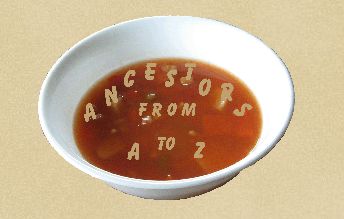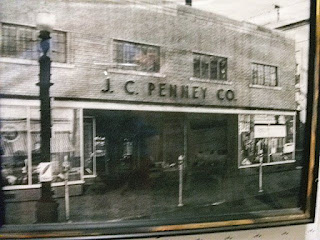For 17 years, the Grand Opera House provided a venue for many of Huron's political and entertainment events. It was built at 32 Third St. SW. , at the site of what many of us know as the former downtown J. C. Penney store. Construction was started in 1885, and it was in operation until it burned to the ground on Dec. 17, 1902. The auditorium had seating for 300, but as a whole, included upstairs and downstairs, it could accommodate 1200-2000 people. The apartment above the Opera House was occupied by Sgt. Glenn of the US Signal Service Station. There were other offices and rooms rented out as well.
The 1898 Sanborn Fire Map shows the building's location in downtown Huron. A grocery store was located to the east, and a steam laundry across the alley to the west were the Grand Opera House's nearest neighbors at that time.
Closeup of the Sanborn map above
The night of the fire was an eventful one for Huron; not only was the opera house in danger, but the entire block, which comprised 20% of Huron's business wealth. The best way to tell the story is to let the Daily Huronite, as written at that time, do it.
Huron Daily Huronite
Dec. 18, 1902, pg. 4
LAST OF "THE GRAND"
Huron Grand Opera House is Burned to the Level of the Street
Most Destructive Fire in Huron for Years Endangers for Hours Balance of the City
A Bad Blaze, With City in Danger, is Well Fought, and the Firemen are Heroes
North Bros. Theater Lost Several Thousand Dollars -- Other Losses
Fire was discovered in the Grand opera house at 4:50 Wednesday afternoon, and for over two hours of stubborn resistance to the efforts of the firemen it was a question whether the balance of the block, representing one-fifth of the business wealth of the city, could be saved. Not until after 7 o'clock was it safe to hazard the notion that the fire was under control. Every foot of available hose in the city was at command, a large force of firemen worked steadily and admirably, water was turned into the Third street water pipes from every direction so that the pressure was the best that could be had and a flood of water was turned into the building, yet the best that could be done was to prevent the fire from spreading. That the fire did not get away from the building is a matter of congratulation to Huron people, as doubtless 20 per cent of the entire business wealth of the city is contained in the block on Third street and Dakota avenue in which the opera house was situated. The opera house building burned to the ground, leaving standing only a part of the front wall.
THE OPERA HOUSE
The Grand opera house building was owned by W. L. Miner, although a sale was in course of completion when the fire alarm was sent in.
The North Bros. Theater company were playing a week's engagement and some members of the company were in the building and in the neighborhood when the fire was first discovered. Smoke was seen curling up through the stage from a fire which had communicated from the furnace to the wood-work in the dressing rooms under the stage, and an alarm was at once sent in. The theatrical people got at some of their trunks, but as soon as the fire chief arrived he ordered all doors closed and no further admittance was allowed to the building. Considerable personal property might have been saved had the doors been open, but the chief doubtless acted wisely in taking every precaution that would seem advisable toward the end of saving the balance of the block.
For an hour and a half there was no blaze, although the dense volumes of smoke showed the interior well [sic] on fire. Lines of hose were played into the front and rear of the doomed building; two streams were played onto the blaze from the side stairway of the Wilcox building, across the alley on the west, while firemen with a line of hose worked from the roof of the adjoining block on the east. In fact, there was a steady flood of water pouring into the blaze from the start, but the building being a brick veneer except on the west where it joined the Meyers solid brick, there was no much of a chance to save the building after fire had once established a right of way between the wood-work and the walls.
Not until 8 P.M. Did the firemen feel confident that adjoining property was comparatively safe, when a recess was taken for supper, although water was played on the ruins all night.
The insurance on the opera house was $3000, as follows: $1000 in the New York Underwriters; $1000 in the Palatine, of London; $1000 in the Glenn's Falls, Minnesota. Policies to the amount of $6000 expired only a few days since.
NORTH BROS. HEAVEY LOSERS
North Bros. Theatrical company were playing an engagement in the Grand, and are heavy losers. Most of the theatrical wardrobe was in the property room – thirty five trunks filled, going up in the blaze.
Every piece of the scenery of the company – probably $400 – was lost.
The North Bros. And members figure themselves out several thousands [sic] dollars. Five hundred dollars would no more than replace each of the ladies' wardrobes, and with thirty-five big property trunks, the loss here reaches well up in the thousands.
Although every man in the company is a loser to some extent, the ladies have fared worse.
The personnel of the North Bros. Company as appearing here this week, all of whom are losers: C. Chapin North, F. C. Carter, Fredk. Clarke, C. B. Monroe, Edwin Patterson, Gavin Dorothy, M. Tarlton, Genevierre Russell, Mabel Colton, Gertrude Clarke, Mae Monroe, Annetta Tarlton, Virginia Harvey, Grant Simpson.
The North Bros. Will play to a benefit performance in the Daum opera house this (Thursday) evening.
THE WESTERN UNION
In case of fire no effort is made to save any of the instruments, furniture, etc. In the offices of the Western Union Telegraph company. So when the fire became too warm in the Western Union offices on the second floor of the opera house building, the manager clicked his last message in the old office, locked the doors, and Mr. Jones and his assistants proceeded to the general offices of the North-Western railway company, where desk room was supplied and business resumed, after an intermission of the time required in walking from the opera house to the new temporary quarters – a distance of two blocks. Commercial business will be handled from this latter location for a few days. The Western Union loss will not exceed $700.
ADJOINING BUILDINGS
The first two brick store buildings on the east, adjoining the opera house, are owned by F. M. Wilcox. The solid wall withstood the fire in good shape, and saved the balance of the block.
The first store room on the east was occupied by Cory & McAdams, dry goods. Everything was taken off the shelves and there will be considerable loss here in the finer grades of dry goods. The store will not open until the insurance adjusters get through with their work, although the proprietors hope to resume business by Monday – possibly before.
Next east from Cory & McAdam is A. Robinson, shoes. Window displays here were taken down and preparations made for moving, but there will be no loss except the time necessary to rearrange.
HISTORY OF THE BUILDING
The Grand opera house was built in 1886, by Helm & Walters, and cost about $22,000. The property changed hands a number of times and was later sold to C. S. Loveland, for $7500. Mr. Loveland managed the house until he sold to W. L. Miner, on May 1, 1902. Mr. Miner paid $8500 for the property and carried $3000 insurance.
Mr. Miner was negotiating a sale of the property when the fire broke out. A check in payment for the same had been drawn and awaited the completion of transfer papers on the part of Mr. Miner. An attorney was at work on the final transfer when the alarm was sounded.
From the opera house east to the Dakota avenue corner and thence south, offices in the second and third floors were occupied by professional men. Here in many cases doctors and lawyers moved out – while clear through the block arrangements were in course toward getting out – it looking at times as though the block was doomed.
OTHER TENANTS
Nels Paulson, tailor, first floor, moved out most of the stuff. Will lose some. Insured.
Byron Healey, bakery, first floor and basement, moved out everything except a stove. Loses value of a bake oven.
Dr. T. J. Wood, office on second floor, saved some of his books and furnishings. However, here also is almost a total loss, in library and surgical instruments. The doctor had $400 insurance.
SPARKS FROM THE BLAZE
During and after the fire the firemen were tendered open house at the restaurant of Eberhart-Huntley, Senator F. M. Wilcox footing the bill. For over two hours not a fireman left his post, after which time it was safe to leave the work to relays.
J. T. Breen is among those who attended the opening and closing dates in the Grand, being present when the building was formally opened and also holding a seat at the North Bros. Entertainment Tuesday night.
The water pressure was excellent, and the Huron fire department did splendidly. The work was well handled and there was at no time a class in the execution of orders. Situated in the center of a solid block of buildings, protection in every direction was necessary and this protection was so nicely balanced that adjoining buildings are scarcely more than scorched. From the start the first was in charge of Chief W. A. Ritschlag, and the HURONITE wants to congratulate the chief and every man on the force for the work done.
The force of firemen from the shops of the North-Western railway company, with one cart, helped the city department in good shape.
North Bros. Figure their loss will exceed $5000.
Immediately after the fire F. M. Wilcox offered Mr. Miner $4000 spot cash for the lot on which the building was situated.
The Grand Opera House
Later, J. C Penney Co. building at that site
The site as it looks today
Sources:
"Do You Remember? Gov. Mellette inauguration held in Grand Opera House in 1885" by Roger Kasa.
"Frame by Frame in Huron," by William Lampe
Huron Daily Huronite, Dec. 18, 1902, pg. 4
Google Earth
Pro-Division Day Celebration and Re-enactment Pamphlet
June 1898 Huron, South Dakota Sanborn Fire Maps







